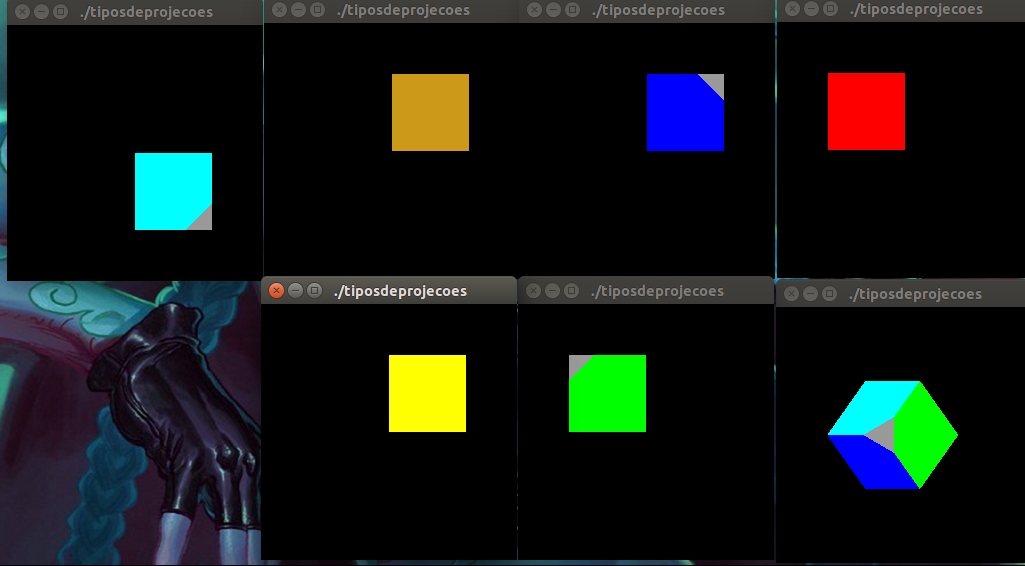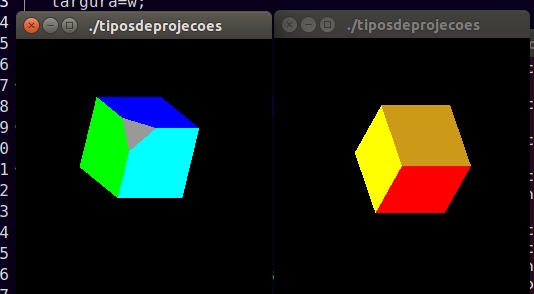Exercício 1
Utilizando o programa exemplos/projecoes.c como referência, implemente um programa tiposdeprojecoes.c. Este programa deverá conter mais sete opções de teclado: t e f, para exibir o topo e o fundo do objeto, F e T, para mostrar a frente e a face traseira, e e d, para mostrar a faces esquerda e direita, respectivamente, e a tecla c, para mostrar o triângulo do canto.
#include <GL/glut.h>
#include <stdlib.h>
#include <stdio.h>
void idle(void);
void init(void);
void display(void);
void keyboard(unsigned char key, int x, int y);
void reshape (int w, int h);
#define AZUL 0.0, 0.0, 1.0
#define VERMELHO 1.0, 0.0, 0.0
#define AMARELO 1.0, 1.0, 0.0
#define VERDE 0.0, 1.0, 0.0
#define CYAN 0.0, 1.0, 1.0
#define LARANJA 0.8, 0.6, 0.1
#define ROSEO 0.7, 0.1, 0.6
#define CINZA 0.6, 0.6, 0.6
static GLfloat vertices[30]={
0.0, 30.0, 30.0, /* 0 */
20.0, 30.0, 30.0, /* 1 */
30.0, 20.0, 30.0, /* 2 */
30.0, 0.0, 30.0, /* 3 */
0.0, 0.0, 30.0, /* 4 */
0.0, 30.0, 0.0, /* 5 */
30.0, 30.0, 0.0, /* 6 */
30.0, 0.0, 0.0, /* 7 */
0.0, 0.0, 0.0, /* 8 */
30.0, 30.0, 20.0 /* 9 */
};
static GLubyte frenteIndices[] = {0,4,3,2,1};
static GLubyte trasIndices[] = {5,6,7,8};
static GLubyte esquerdaIndices[] = {0,5,8,4};
static GLubyte direitaIndices[] = {2,3,7,6,9};
static GLubyte topoIndices[] = {0,1,9,6,5};
static GLubyte fundoIndices[] = {3,4,8,7};
static GLubyte trianguloIndices[] = {1,2,9};
static int eixoy, eixox;
int largura, altura;
int main(int argc, char** argv){
int i;
glutInit(&argc, argv);
glutInitDisplayMode (GLUT_DOUBLE | GLUT_RGB);
glutInitWindowSize (256, 256);
glutInitWindowPosition (100, 100);
glutCreateWindow (argv[0]);
init();
glutDisplayFunc(display);
glutKeyboardFunc(keyboard);
glutReshapeFunc(reshape);
glutMainLoop();
return 0;
}
void init(void){
glClearColor(0.0, 0.0, 0.0, 0.0);
glOrtho (-50, 50, -50, 50, -50 , 50);
glEnable(GL_DEPTH_TEST);
glEnable(GL_CULL_FACE);
}
void reshape (int w, int h){
glViewport (0, 0, (GLsizei) w, (GLsizei) h);
largura=w;
altura=h;
}
void display(void){
glPushMatrix();
glRotatef ((GLfloat) eixoy, 0.0, 1.0, 0.0);
glRotatef ((GLfloat) eixox, 1.0, 0.0, 0.0);
glRotatef ((GLfloat) eixoz, 0.0, 0.0, 1.0);
glClear(GL_COLOR_BUFFER_BIT | GL_DEPTH_BUFFER_BIT );
glEnableClientState(GL_VERTEX_ARRAY);
glVertexPointer(3, GL_FLOAT, 0, vertices);
glColor3f (AZUL); /* frente */
glDrawElements(GL_POLYGON, 5, GL_UNSIGNED_BYTE, frenteIndices);
glColor3f (AMARELO); /* esquerda */
glDrawElements(GL_POLYGON, 4, GL_UNSIGNED_BYTE, esquerdaIndices);
glColor3f (VERMELHO); /* tras */
glDrawElements(GL_POLYGON, 4, GL_UNSIGNED_BYTE, trasIndices);
glColor3f (VERDE); /* direita */
glDrawElements(GL_POLYGON, 5, GL_UNSIGNED_BYTE, direitaIndices);
glColor3f (CYAN); /* topo */
glDrawElements(GL_POLYGON, 5, GL_UNSIGNED_BYTE, topoIndices);
glColor3f (LARANJA); /* fundo */
glDrawElements(GL_QUADS, 4, GL_UNSIGNED_BYTE, fundoIndices);
glColor3f (CINZA); /* triangulo */
glDrawElements(GL_POLYGON, 3, GL_UNSIGNED_BYTE, trianguloIndices);
glDisableClientState (GL_VERTEX_ARRAY);
glPopMatrix();
glutSwapBuffers();
}
void keyboard(unsigned char key, int x, int y){
switch (key) {
case 27:
exit(0);
break;
case 'a':
printf("%d, %d\n",x,y);
break;
case 'y':
eixoy = (eixoy + 5) % 360;
glutPostRedisplay();
break;
case 'Y':
eixoy = (eixoy - 5) % 360;
glutPostRedisplay();
break;
case 'x':
eixox = (eixox + 5) % 360;
glutPostRedisplay();
break;
case 'X':
eixox = (eixox - 5) % 360;
glutPostRedisplay();
break;
case 'p':
glLoadIdentity();
gluPerspective(65.0, (GLfloat) largura/(GLfloat) altura, 20.0, 120.0);
gluLookAt(0, 0, -90, 0, 0, 0, 0, 1, 0);
glutPostRedisplay();
break;
case 't':
eixox=90;
eixoy=0;
glLoadIdentity();
glOrtho (-50, 50, -50, 50, -50 , 50);
glutPostRedisplay();
break;
case 'f':
eixox=-90;
eixoy=0;
glLoadIdentity();
glOrtho (-50, 50, -50, 50, -50 , 50);
glutPostRedisplay();
break;
case 'e':
eixox=0;
eixoy=90;
glLoadIdentity();
glOrtho (-50, 50, -50, 50, -50 , 50);
glutPostRedisplay();
break;
case 'd':
eixox=0;
eixoy=-90;
glLoadIdentity();
glOrtho (-50, 50, -50, 50, -50 , 50);
glutPostRedisplay();
break;
case 'T':
glLoadIdentity();
eixox=0;
eixoy=180;
glOrtho (-50, 50, -50, 50, -50 , 50);
glutPostRedisplay();
break;
case 'F':
eixox=0;
eixoy=0;
glLoadIdentity();
glOrtho (-50, 50, -50, 50, -50 , 50);
glutPostRedisplay();
break;
case 'o':
glLoadIdentity();
glOrtho (-50, 50, -50, 50, -50 , 50);
glutPostRedisplay();
break;
case 'c':
eixox=45;
eixoy=-45;
glLoadIdentity();
glOrtho (-50, 50, -50, 50, -50 , 50);
glutPostRedisplay();
break;
}
}
Exercício 2
A função glutIdleFunc() é usada pelo GLUT para realizar operações em segundo plano ou animações, enquanto não recebe eventos de sistema. O seu protótipo é:
void glutIdleFunc(void *func(void));
Tomando como base o programa exemplos/projecoes.c, utilizando a função glutIdleFunc() e crie uma função de retorno idle(). Nesta função, os valores dos ângulos eixox e eixoy devem ser incrementados de valores constantes pequenos e diferentes, de modo a possibilitar uma animação. Utilize a função usleep() para introduzir retardos entre as apresentações dos quadros da animação, tornando mais agradável a visualização. Mantenhas as teclas o e p para chavear entre projeções ortogonais e de perspectiva.
#include <GL/glut.h>
#include <stdlib.h>
#include <stdio.h>
#include <unistd.h>
void idle(void);
void init(void);
void display(void);
void keyboard(unsigned char key, int x, int y);
void reshape (int w, int h);
#define AZUL 0.0, 0.0, 1.0
#define VERMELHO 1.0, 0.0, 0.0
#define AMARELO 1.0, 1.0, 0.0
#define VERDE 0.0, 1.0, 0.0
#define CYAN 0.0, 1.0, 1.0
#define LARANJA 0.8, 0.6, 0.1
#define ROSEO 0.7, 0.1, 0.6
#define CINZA 0.6, 0.6, 0.6
static GLfloat vertices[30]={
0.0, 30.0, 30.0, /* 0 */
20.0, 30.0, 30.0, /* 1 */
30.0, 20.0, 30.0, /* 2 */
30.0, 0.0, 30.0, /* 3 */
0.0, 0.0, 30.0, /* 4 */
0.0, 30.0, 0.0, /* 5 */
30.0, 30.0, 0.0, /* 6 */
30.0, 0.0, 0.0, /* 7 */
0.0, 0.0, 0.0, /* 8 */
30.0, 30.0, 20.0 /* 9 */
};
static GLubyte frenteIndices[] = {0,4,3,2,1};
static GLubyte trasIndices[] = {5,6,7,8};
static GLubyte esquerdaIndices[] = {0,5,8,4};
static GLubyte direitaIndices[] = {2,3,7,6,9};
static GLubyte topoIndices[] = {0,1,9,6,5};
static GLubyte fundoIndices[] = {3,4,8,7};
static GLubyte trianguloIndices[] = {1,2,9};
static int eixoy, eixox, eixoz;
int largura, altura;
int main(int argc, char** argv){
int i;
glutInit(&argc, argv);
glutInitDisplayMode (GLUT_DOUBLE | GLUT_RGB);
glutInitWindowSize (256, 256);
glutInitWindowPosition (100, 100);
glutCreateWindow (argv[0]);
init();
glutDisplayFunc(display);
glutKeyboardFunc(keyboard);
glutReshapeFunc(reshape);
glutIdleFunc(idle);
glutMainLoop();
return 0;
}
void init(void){
glClearColor(0.0, 0.0, 0.0, 0.0);
glOrtho (-50, 50, -50, 50, -50 , 50);
glEnable(GL_DEPTH_TEST);
glEnable(GL_CULL_FACE);
}
void reshape (int w, int h){
glViewport (0, 0, (GLsizei) w, (GLsizei) h);
largura=w;
altura=h;
}
void idle(void){
/*
eixoy = (eixoy + 1);
eixox = (eixox + 2);
usleep(10000);
glutPostRedisplay();*/
}
void display(void){
glPushMatrix();
glRotatef ((GLfloat) eixoy, 0.0, 1.0, 0.0);
glRotatef ((GLfloat) eixox, 1.0, 0.0, 0.0);
glRotatef ((GLfloat) eixoz, 0.0, 0.0, 1.0);
glClear(GL_COLOR_BUFFER_BIT | GL_DEPTH_BUFFER_BIT );
glEnableClientState(GL_VERTEX_ARRAY);
glVertexPointer(3, GL_FLOAT, 0, vertices);
glColor3f (AZUL); /* frente */
glDrawElements(GL_POLYGON, 5, GL_UNSIGNED_BYTE, frenteIndices);
glColor3f (AMARELO); /* esquerda */
glDrawElements(GL_POLYGON, 4, GL_UNSIGNED_BYTE, esquerdaIndices);
glColor3f (VERMELHO); /* tras */
glDrawElements(GL_POLYGON, 4, GL_UNSIGNED_BYTE, trasIndices);
glColor3f (VERDE); /* direita */
glDrawElements(GL_POLYGON, 5, GL_UNSIGNED_BYTE, direitaIndices);
glColor3f (CYAN); /* topo */
glDrawElements(GL_POLYGON, 5, GL_UNSIGNED_BYTE, topoIndices);
glColor3f (LARANJA); /* fundo */
glDrawElements(GL_QUADS, 4, GL_UNSIGNED_BYTE, fundoIndices);
glColor3f (CINZA); /* triangulo */
glDrawElements(GL_POLYGON, 3, GL_UNSIGNED_BYTE, trianguloIndices);
glDisableClientState (GL_VERTEX_ARRAY);
glPopMatrix();
glutSwapBuffers();
}
void keyboard(unsigned char key, int x, int y){
switch (key) {
case 27:
exit(0);
break;
case 'a':
printf("%d, %d\n",x,y);
break;
case 'y':
eixoy = (eixoy + 5) % 360;
glutPostRedisplay();
break;
case 'Y':
eixoy = (eixoy - 5) % 360;
glutPostRedisplay();
break;
case 'x':
eixox = (eixox + 5) % 360;
glutPostRedisplay();
break;
case 'X':
eixox = (eixox - 5) % 360;
glutPostRedisplay();
break;
case 'p':
glLoadIdentity();
gluPerspective(65.0, (GLfloat) largura/(GLfloat) altura, 20.0, 120.0);
gluLookAt(0, 0, -90, 0, 0, 0, 0, 1, 0);
glutPostRedisplay();
break;
case 'o':
glLoadIdentity();
glOrtho (-50, 50, -50, 50, -50 , 50);
glutPostRedisplay();
break;
}
}
}